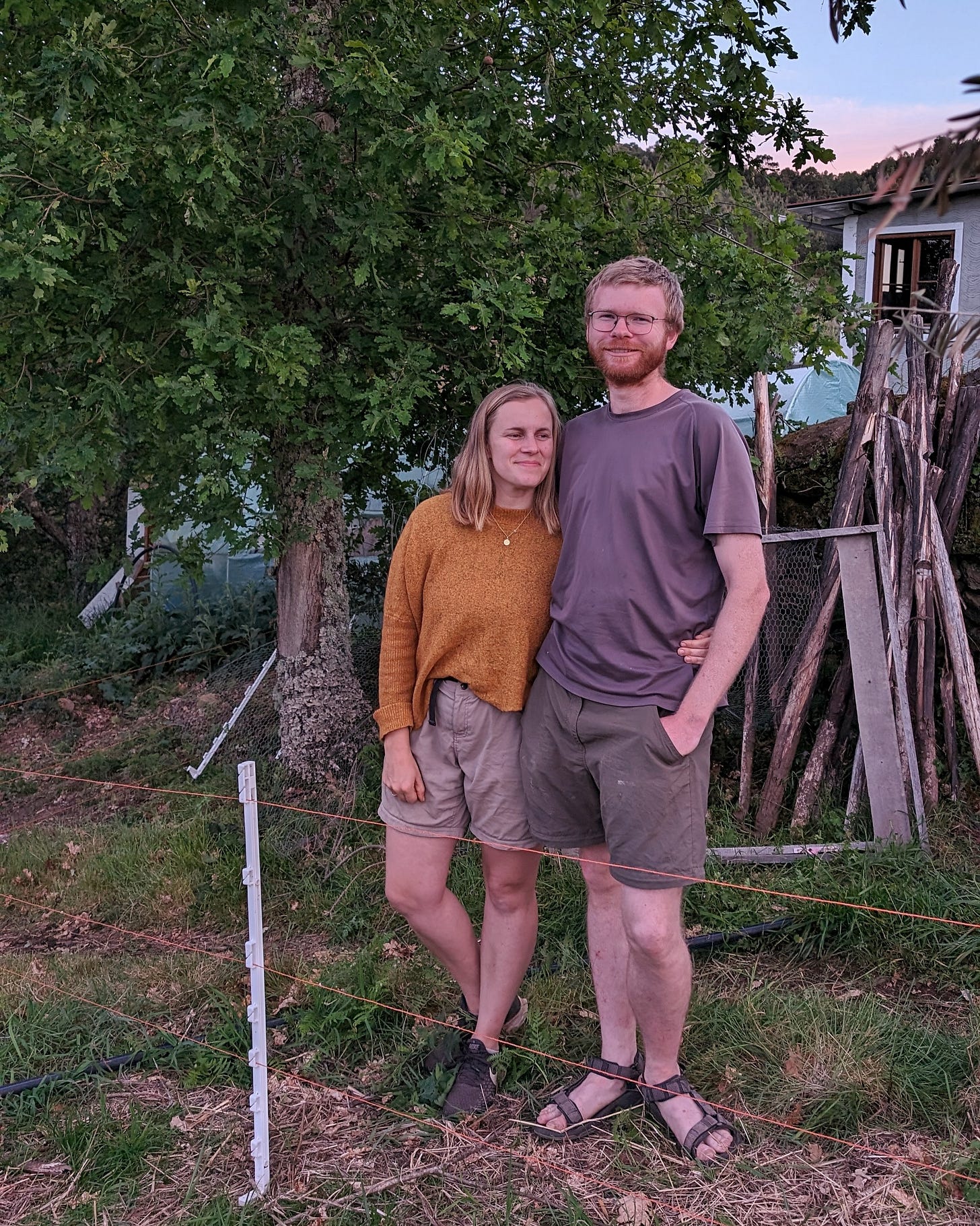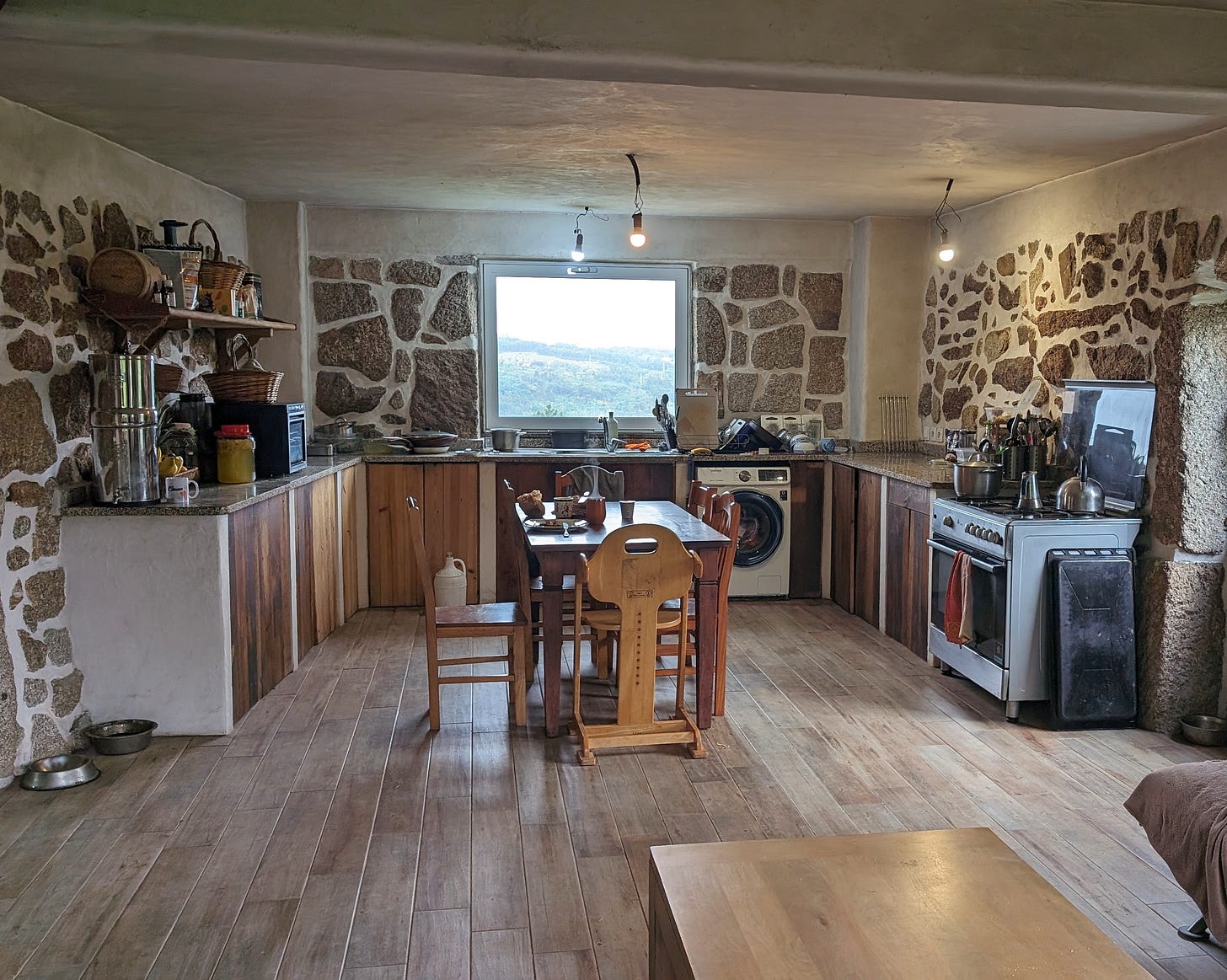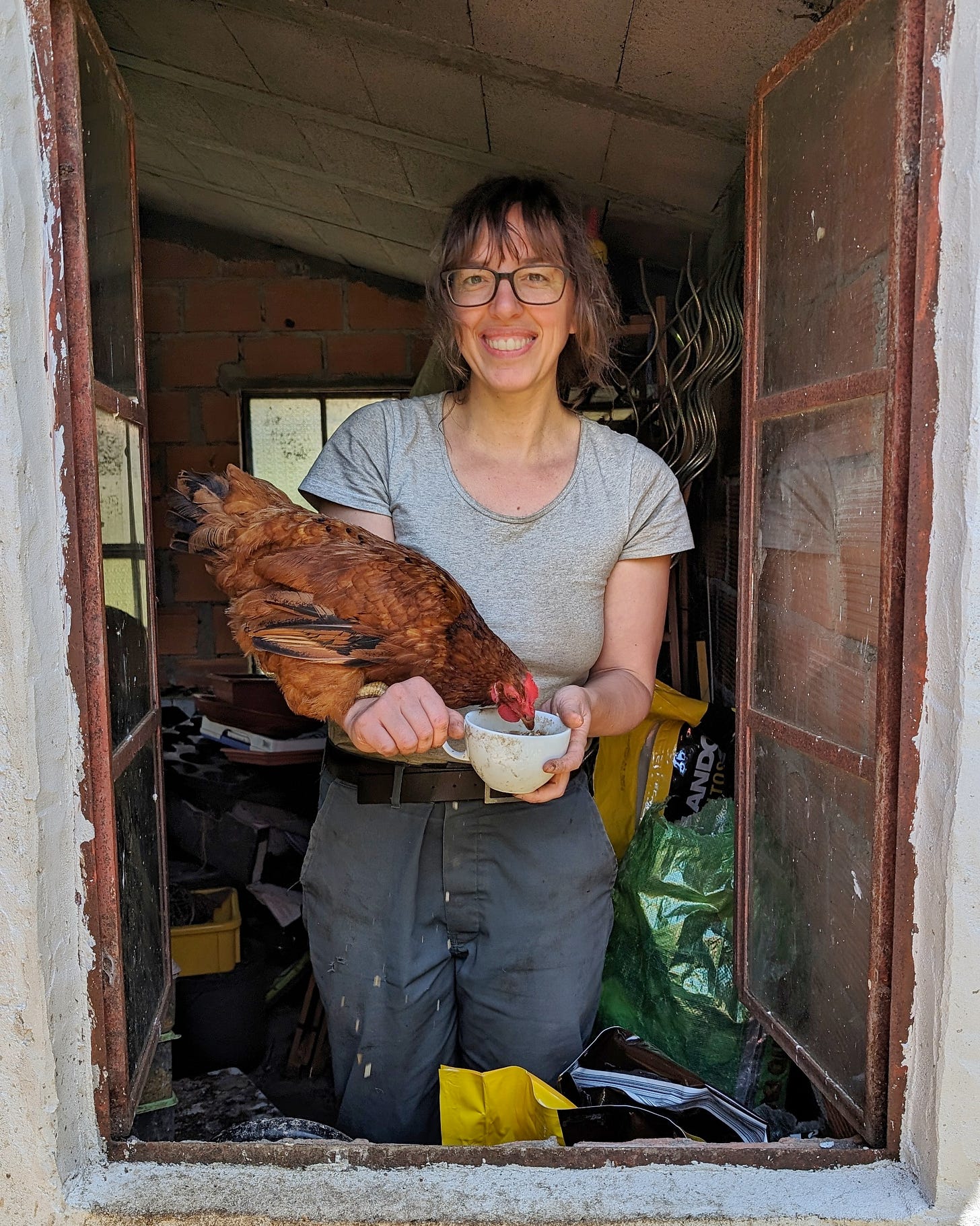The rural life of self-sufficiency: why I want it
And if I’m cut out for it. I've been working on farms in Portugal to find out
Here’s a one minute video I shared on Instagram to accompany this column.
Hi! This is Leyla from A Day Well Spent, a newsletter seeking pathways to more purposeful living.
What subscribers received recently:
‘Do it for your future self’ — a quickfire interview with serial language learner, lifelong journaller, TV host and entrepreneur, Jo Franco
In pursuit of less — how decluttering my home changed the course of my life, with pics 📷
You can subscribe with your email to ensure you never miss my posts:
The rural life of self-sufficiency: why I want it
Many of us dream of living differently because we can see what our modern lifestyles are doing to us and our planet. They are killing both.
I have been driven by a desire to flee the city and pursue a more self-sufficient life for several years now. It’s something I feel deep within the marrow of my bones.
Nothing I do feels more worthwhile or vital than when I’m outside under the sun, engaging in activities that afford me the ability to live my life ‘richly’. Activities like growing vegetables, saving seed, fermenting food and making bread.
I might currently live in a 2-bedroom terraced house in southwest London, with an urban garden and a patio just about big enough for a small foldaway table and two chairs. But I see big skies, chicken coops and beehives in my future.
The way we live isn’t working
In my piece the power of self-reliance, I wrote about why I think we need to stop outsourcing so much of our lives. We have become ‘de-skilled’ since the world industrialised, losing our ability to live off the land and exercise agency over our own health and wellbeing.
There was once a time when Nature provided for all of our needs, from medicine and education to recreation and spiritual connection, the knowledge of which was passed down by our ancestors.
But today, we live in an anthropocentric age that sees time-honoured life skills of how to live well, purposefully and in harmony with Nature, replaced by modern society's obsession with instant gratification and superficial connection. We are left anxious, exhausted and fraying at the seams that barely hold us together.
The yawning chasm this disconnection and de-skilling has left is filled by corporations.
Some people prefer to order an overpriced coffee delivered to their front door by an underpaid driver, rather than walking a few feet to their kitchen and making one themselves (a true story I recently heard from the mortified Italian mother of said coffee delivery purchaser).
We are taught to believe that spending our money on things and services will make our lives easier, we will be freer. And yet as a society, we are more unavailable, unfulfilled and physically and mentally unwell than ever before.
I know this is just someone’s viral Instagram reel and every country and culture has their own problems, but I nodded along to much of what this woman is saying.
The way we live isn’t working. As
says, the way we live is not normal.Am I cut out for this life?
But pursuing the idyllic life of ‘four acres and freedom’ is neither easy nor convenient. Managing a smallholding, homestead or small farm – that is, an area of land used to grow and produce much of the things a household needs to live – is an incredible amount of hard work.
It’s full of failures, disappointment and if you have livestock, death. It can be isolating and restrictive. Expectations are high and the level of responsibility is huge. Many escape the rat race to follow this dream, only to find themselves suffering from a different kind of burnout.
I am a Londoner born and bred. I do not come from a farming (or even casual vegetable growing) family. Nor do I have any experience living outside of a city; I’ve never even had a pet. I have no idea where this calling is coming from. Maybe it’s some latent ancestral memory trying to break through. Or perhaps I’m chasing a romanticized dream of what I think this kind of life would be like.
Either way, this calling to live closer to the land gets louder with each passing day. And now it’s the only thing I can hear.
But is this really the life I want? Am I cut out for what it takes?
I figured it was about time I answered these questions with some hands-on experience of living that life. So I spent a good chunk of April staying and working on three rural farms in central Portugal (why Portugal? it’s sunnier than the UK), organised through the WWOOF (Worldwide Opportunities on Organic Farms) and WorkAway platforms. I got back just a few days ago.
I have wanted to do this for absolutely ages.
Farm 1 - ‘would you be comfortable with this?’
My first stop was Pedrógão Grande staying with young parents Zak and Jackie and their cute toddler, along with three sheep, rabbits, their dog Floki and a tiny goat, in a small house on their 5 acres (2 hectares) of land. They moved there full time from Germany in 2022.
Their accommodation is basic with a compost toilet in an outhouse and the shower hose is the only connection to running water inside their home. But they have made a life for themselves, working extremely hard to build a sustainable future for their child through the regeneration of their land.
A few days before I was due to arrive, Zak sent me an email asking if I’d be comfortable helping him out with something.
‘The job would be to slaughter a sheep (a yearling lamb) - which I would do myself of course - then to skin, eviscerate, and cut the carcass into primals for ageing. I've never processed a lamb before so a second pair of hands would be a great help to make the process go smoothly.’
My instinctive reaction was, this is an important event to be a part of. I ran it past my meat-eating parents on our WhatsApp group.
Mum: ‘I would rather be vegan than have to do something like that… I’m not interested to know the details, I just eat it and that is how I want it to stay.’
Dad: ‘As you plan to live that life it’s good you experience it. Actually, on second thought, it’s a blessing you’ve been presented with this opportunity.’
I told Zak it was a yes.
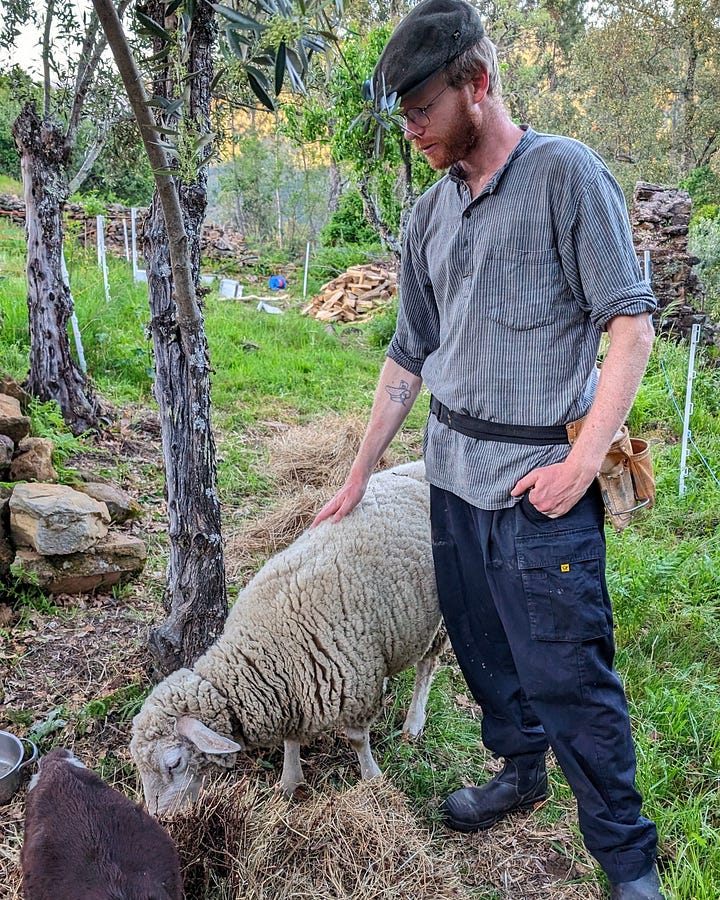
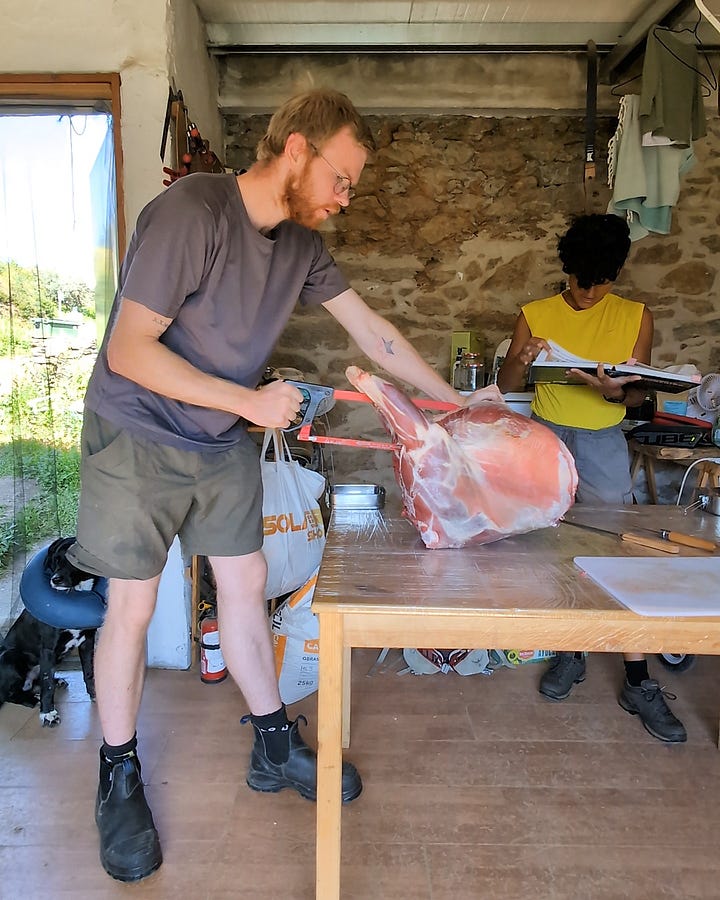
The event took place on my first full day on the farm. Zak and I rose before the dawn and over the course of a few hours, I both witnessed and participated in the transition of a living, sentient being into a clean, whole carcass you’d find aging in the walk-in fridge at the back of a butchers.
I was taken aback by my seemingly limitless tolerance for disgust. The blood stained fleece, dangling severed head, gaseous guts, sheep shit and the endless parade of warm and slippery organs to fish out - none of that bothered me. But in the same way your body continues to sway after a day spent out at sea, the white noise from the swarms of flies droned in my ears like a distant helicopter rotor blade until I went to bed that evening.
A live sheep and a dead sheep are terms I understand, each well defined in their mortal realms. But that liminal space between life and death is a dimension I had yet to visit. The animal drew its final breaths in Zak’s arms, each wheezing exhale more drawn out than the one before, until the last lingering moments of life ebbed away with the dawn.
I did not know this animal, I had no history with it. Yet the emotion that washed over me and the stillness of the end will stay with me for a long time.
A year of grazing for a year of meat, for a family that were once mostly vegan. It took a day for us to butcher and portion up the carcass, me turning the pages of a reference book as Zak sawed through bone.
After 3 days of aging in the fridge and on my final night, Jackie cooked a lamb curry and we all ate a part of Franky the sheep in one of the most meaningful meals I’ll likely ever have. Thank you to Zak and Jackie for letting me be a part of this hugely significant family first.
You can read more about this day of the sheep, plus another equally eventful day (when their toddler went dramatically missing… it’s a happy ending) in this article by
who writes on Substack.Farm 2 - part of a Portuguese family
A coach ride took me to my next farm located in Fundão, famous for its cherries. I stayed in the 200 year old farmhouse of a wonderful and warm Portuguese family, with Paulo the farmer, Manuela the farmer’s wife and Maria the 85 year old Grandmother, all taking me in as if I was one of their own.

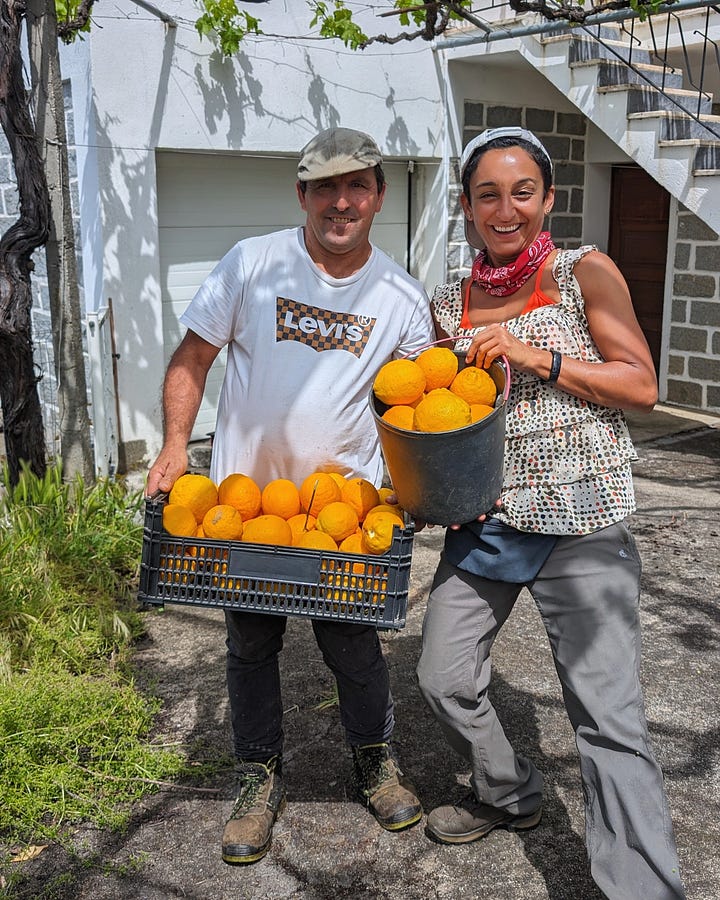
Their 20 aces (8 hectares) of certified organic land is punctuated with majestic olive trees and was awash with spring wildflowers during my stay, grazed on by the handful of sheep and goats. Manuela cooked two substantial hot meals a day loaded with meat or fish and a side of lightly cooked cabbage or salad leaves from the garden, plus desserts.
We had wine with lunch, wine with dinner and a couple of small beers in the local café at the end of a day’s hard graft clearing land with licensed controlled fires, flopping down at the outside tables, stinking of smoke and covered in bramble scratches. I soon understood the importance of the end of day ritual of socialising with the locals and the reward of a cold 25cl Imperial.
I felt like Paulo’s farming apprentice; I did so many things. I sowed potatoes, planted out vegetables, rode on his tractor, went to market, foraged for herbs, picked oranges and fell in love with his dog, Arturo.
Paulo starts his working day at 7am milking his two goats and within the hour, he’s turned the milk into cheese. He makes one small wheel a day, ages it for a month and then either eats it or sells it.
This organic cheese, along with Manuela’s homemade bread and the organic olive oil from their own trees, was my breakfast each morning. I brought four litres of that liquid gold back home with me in my suitcase.
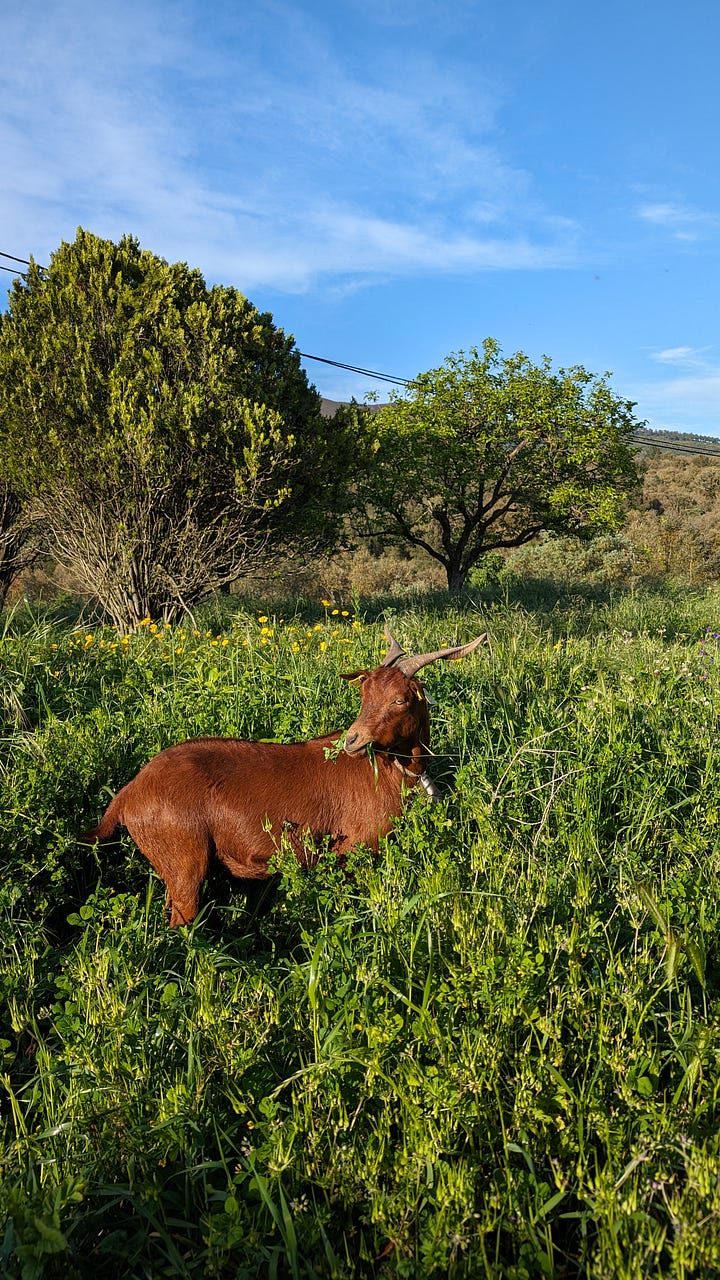
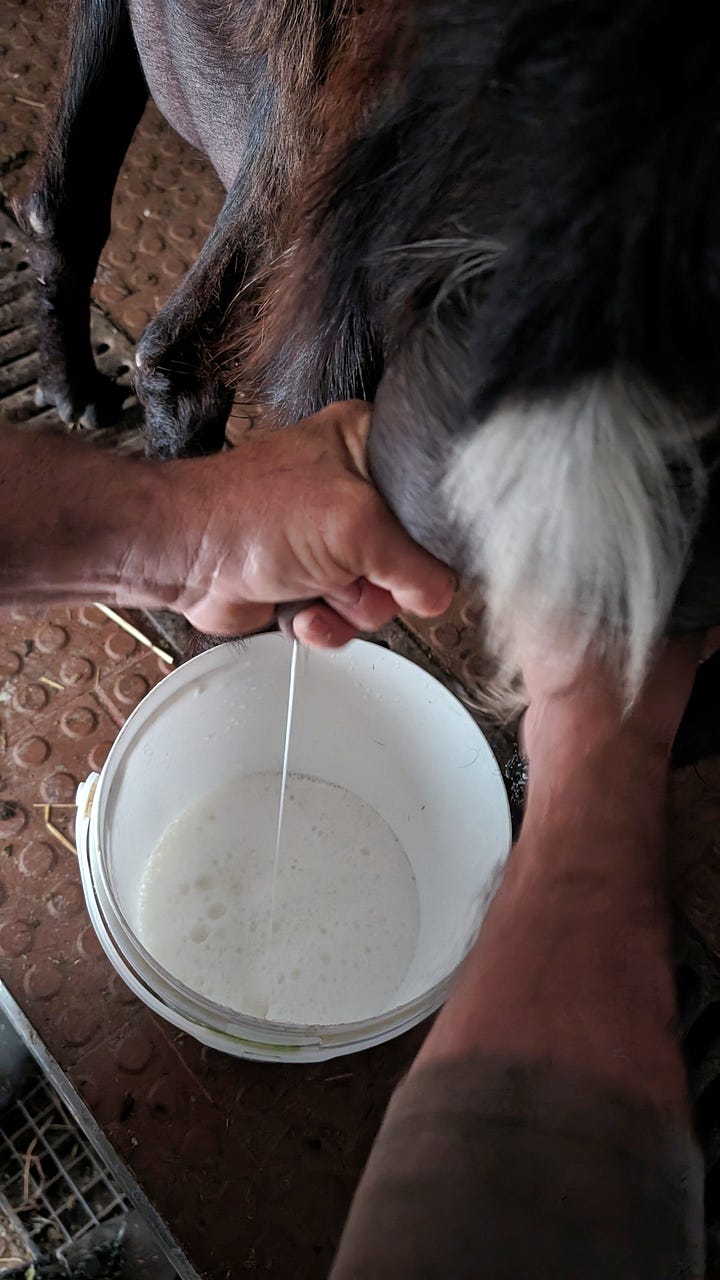
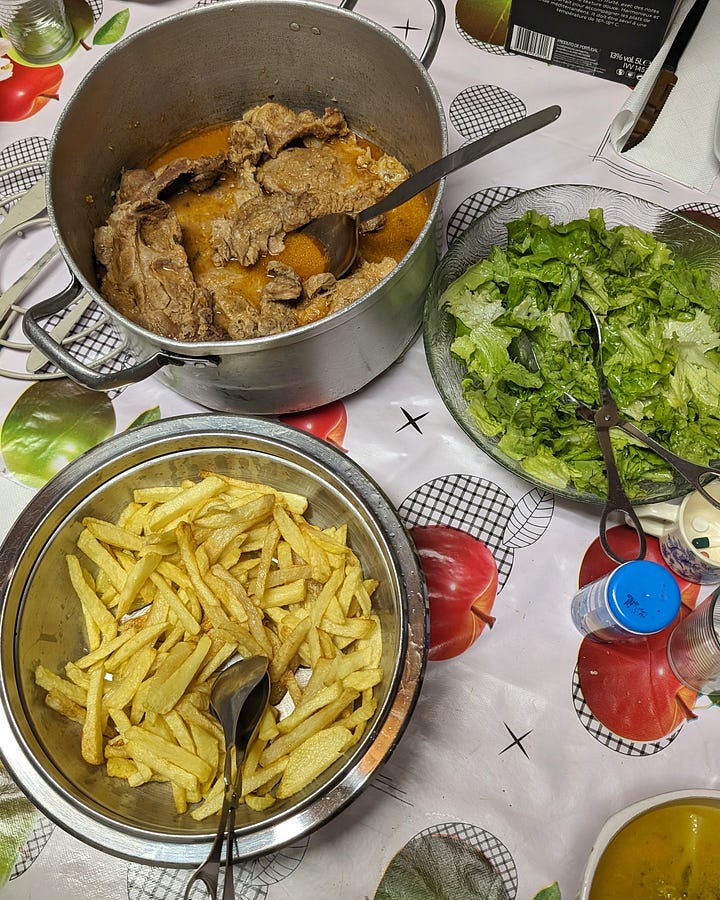
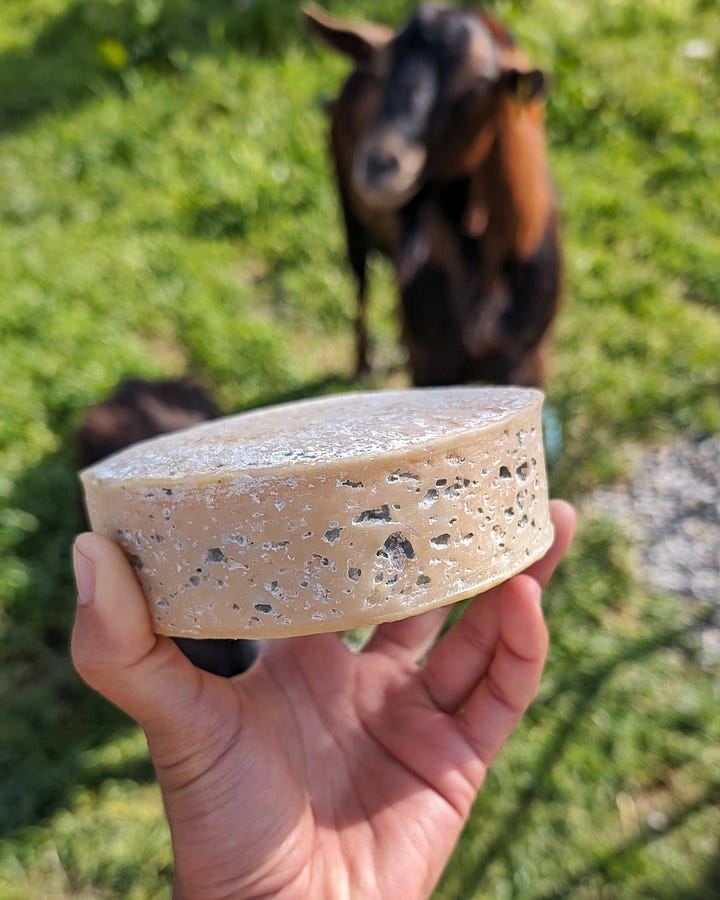
Up until two months ago, Paulo had 20 goats. But a pack of wild dogs he had befriended — and was even feeding — massacred 17 of them late one evening, the family jolted awake in their beds by the harrowing cacophony.
‘It is not easy being a farmer,’ Paulo told me. ‘I had to get a good poison to kill the dogs, something that would do the job quickly. I did not want to do it, but I had to.’
I never did ask him what he did with 17 dead (or almost dead) goats in the middle of the night.
Farm 3 - the herbal one
My third and final stop was a terraced organic farm of 5.5 acres (2.3 hectares) with over 100 mature fruit trees near Carregal do Sal. It’s where Marie the Herbalist Therapist and Naturopath (Belgian), Gabor the Reiki Master (Hungarian) and their 7 year old son, cultivate medicinal plants to make artisanal herbal products.
I was amazed at Marie’s knowledge of the power of plants and the quality of the medicine cabinet she creates — she is about ⅓ of the way through a University level qualification of Clinical Herbalism — I bought a bunch of her balms and tinctures.
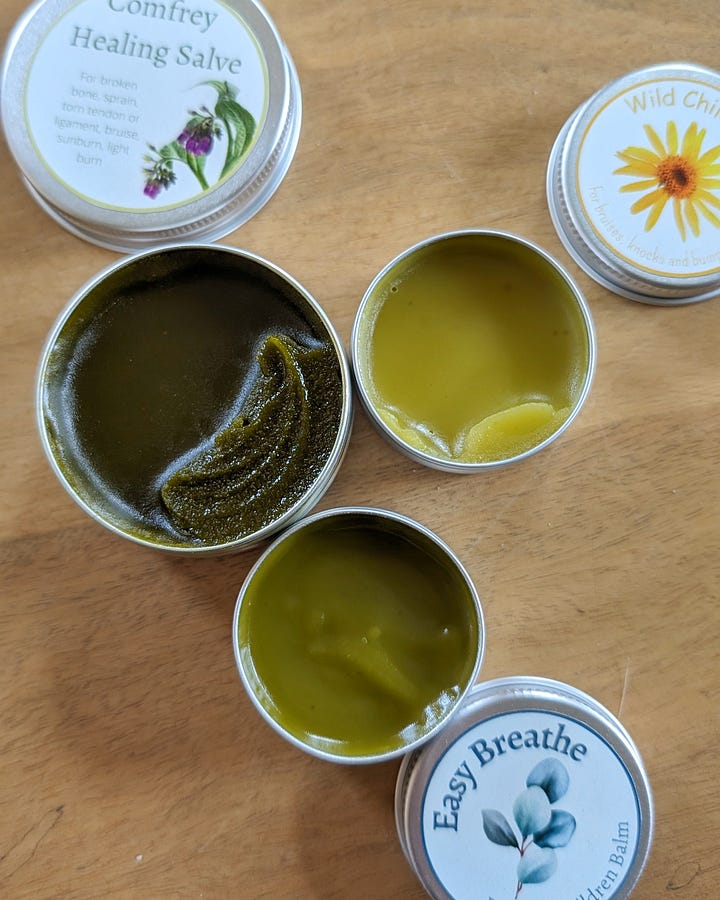

Their completely off-grid and recently renovated home lies at the end of a winding dirt track that weaves through woodland, eventually opening up to the most magnificent view over a valley. They have their own water supply and use solar power for electricity and wood for hot water. I helped them out with weeding beds ready for this season’s vegetable growing, and lots of Substack advice.
I think I’ve convinced Marie to join Substack to share her immense knowledge about what plants can do – she will hopefully be writing a guest post for me in the coming months about adaptogens, exciting! This is her and her husband’s website.
Is this the life for me?
I returned home with sunburnt shoulders and a bump on my forehead from walking into a low hanging olive branch that nearly knocked me out cold. A small caterpillar fell out of my hair on the flight back. And the dirt under my fingernails was so embedded, I had to use the eye of a needle to scour it out.
Do I still want to live this life? It’s a resounding yes.







